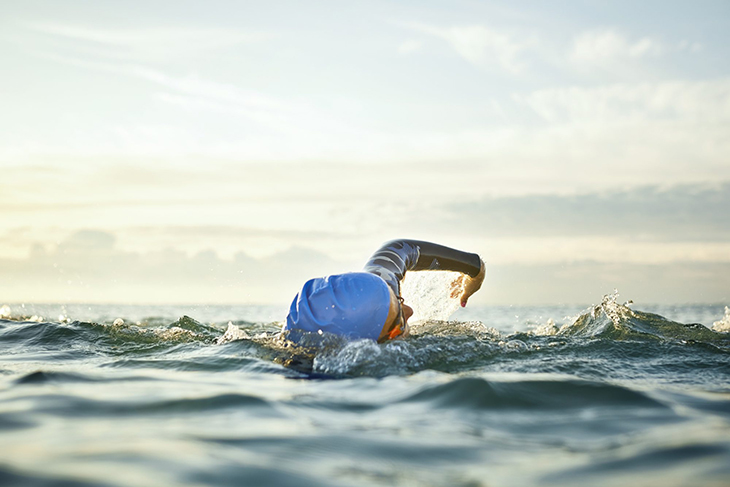
Recent research suggests that immersing oneself in cold water, particularly through activities like open water swimming, may offer a range of benefits for both physical and mental well-being, especially for women experiencing menopause-related symptoms. The idea of cold water therapy has gained traction due to various factors, including its portrayal in popular media like television shows and movies, as well as anecdotal evidence shared among enthusiasts.
While the exact mechanisms behind these benefits are still being studied, early findings suggest that cold water immersion could trigger the release of neurotransmitters associated with mood regulation, potentially offering relief from symptoms of depression and anxiety. Additionally, there’s growing interest in exploring how swimming in cold water might augment the overall therapeutic effects of swimming, though further research is warranted to fully understand the risks and rewards.
Specifically concerning women in midlife and beyond, recent studies have delved into the potential advantages of cold water swimming for managing menopausal symptoms. One study, published in the journal Post Reproductive Health, found promising indications that open water swimming could help alleviate issues such as hot flashes, anxiety, and mood swings commonly experienced during menopause.
So, if you’re curious about the potential benefits of cold water swimming, it might be worth considering taking the plunge, even if it’s just for a quick dip to start. The growing body of research suggests that the chilly waters could hold significant therapeutic potential for both body and mind.
“Cold water has previously been found to improve mood and reduce stress in outdoor swimmers, and ice baths have long been used to aid athletes’ muscle repair and recovery,” said the senior author, Joyce Harper, PhD, in a press release. She is a professor of reproductive science and reproductive health at University College London.
“Our study supports these claims; meanwhile, the anecdotal evidence also highlights how the activity can be used by women to alleviate physical symptoms, such as hot flushes, aches and pains,” said Dr. Harper.
Physicians specializing in menopause concur that while hormone therapy (HT) stands as a primary treatment, adopting a “holistic” approach is equally crucial.
“Many women, whether menopausal or not, find cold water swimming beneficial, especially for their mental health,” said Louise Newson, MBChB. She is a physician and menopause specialist at Newson Health Menopause and Wellbeing Centre in Stratford-Upon-Avon, England. She also is not affiliated with the University College London study.
For Women Experiencing Menopause, Cold Water Swimming Helped Alleviate Symptoms
Dr. Harper and her team embarked on a study to delve into the impact of open water swimming on the health and well-being of women, with a particular focus on its correlation with menstruation and menopause. Leveraging social media platforms, including cold water swimming communities, they recruited female open water swimmers who then participated in a comprehensive 42-question survey.
The response was substantial, with over 1,100 women participating, with nearly 800 of them in the midst of menopause. Interestingly, the majority of these women engaged in open water swimming throughout the year, opting for swimsuits rather than wetsuits.
The findings from the survey shed light on the significant benefits experienced by women in managing menopause symptoms through cold water swimming. Among the approximately 700 women experiencing menopausal symptoms, almost half reported a notable reduction in anxiety, while around one-third noticed improvements in mood swings, low mood, and hot flashes. Remarkably, over 60 percent of the participants actively utilized swimming as a means to alleviate their symptoms.
This research underscores the potential of open water swimming as a holistic approach to enhancing women’s health and well-being, particularly during transitional phases like menopause. It highlights the therapeutic value of immersing oneself in cold water environments, not only for physical fitness but also for mental and emotional wellness, providing valuable insights for both healthcare professionals and individuals seeking alternative avenues for managing menopausal symptoms.
Exercise with Friends Helps Build Community
In addition to alleviating menopausal symptoms, women cited outdoor exposure, enhancing mental well-being, and engaging in physical activity as their primary reasons for cold water swimming.
“The majority of women swim to relieve symptoms such as anxiety, mood swings, and hot flushes. They felt that their symptoms were helped by the physical and mental effects of the cold water, which was more pronounced when it was colder,” said Harper. The benefits were also seen for those who took a dip for longer periods of time.
Further research still needs to be conducted in terms of frequency, duration, temperature, and exposure needed to reduce menopause symptoms, as per Harper. “However, we hope our findings may provide an alternative solution for women struggling with the menopause and encourage more women to take part in sports,” she said.
“The great thing about cold water swimming is it gets people exercising in nature, and often with friends, which can build a great community,” Harper said.
The extent to which these advantages would apply to the broader population remains uncertain. The authors of the study recognize potential bias as the survey was exclusively completed by women already engaged in cold water swimming.
Furthermore, the authors observed that women who had already perceived a link between menopausal symptoms and cold water swimming were more inclined to participate in the survey.
‘I Feel Like Me at My Best’ According to a Cold Water Swimmer
Several women cited in the research expressed that they perceived cold water as an “immediate stress and anxiety reliever,” characterizing the experience as “healing.”
“Cold water is phenomenal. It has saved my life. In the water, I can do anything. All symptoms (physical and mental) disappear, and I feel like me at my best,” said one 57-year-old woman who responded in the study.
Cold Open Water Swimming Has Risks
Although cold water swimming offers advantages, it also carries inherent risks.
“Caution must be taken when cold water swimming, as participants could put themselves at risk of hypothermia, cold water shock, cardiac rhythm disturbances, or even drowning,” said Harper.
She added that water quality standards may also vary depending on the location of swimming, potentially increasing the risk of gastroenteritis and other infections.
Safety Tips for Open Water Swimming
Considering trying out the advantages of swimming in cold water? It’s advisable to consult your healthcare provider beforehand to ensure safety according to your fitness level and medical background.
Here are some comprehensive guidelines provided by Chill Therapy, a non-profit organization based in the United Kingdom, which collaborates with licensed healthcare professionals and Water Safety USA:
- Conduct Thorough Research: Before venturing into open waters, it’s crucial to gather information regarding various factors such as water depth, temperature, currents, and wave conditions. Avoid swimming in areas where water quality might pose health risks, such as those with foam, scum, algae, or large groups of waterfowl like ducks or geese.
- Never Swim Alone: It’s a fundamental safety rule to always have a companion when swimming, regardless of your swimming proficiency. Even strong swimmers are susceptible to unforeseen dangers, and having a companion significantly reduces risks.
- Ensure Swimming Proficiency: Prior to open water swimming, it’s advisable to be proficient in basic swimming skills. While you don’t need to be an elite swimmer like Diana Nyad, being able to swim a few laps in a pool unaided is essential. If you have underlying health conditions, consult your doctor before attempting open water swimming.
- Be Prepared: Pack essential items for your swim, including warm clothing, a waterproof jacket, towels, robes, goggles (optional but helpful), swimsuit, and a bag for your belongings. In colder months, bring along additional items such as warm drinks, gloves, and a wool hat. Ensure you have suitable footwear for walking to and from your car, especially ones that are easy to put on and take off.
- Enter the Water Carefully: When entering the water, do so slowly, ensuring your head remains above water and your feet are on solid ground. Be aware of the “gasp” reflex that can occur when cold water makes contact with your skin.
- Start with Short Dips: If you’re new to cold water swimming, begin with brief dips lasting one or two minutes. Even a short exposure can provide health benefits. Exit the water while you still feel comfortable and maintain full movement in your hands and fingers.
- Warm Up Afterwards: After swimming, promptly dry off and put on warm clothing, focusing on multiple layers to trap heat. Re-warm yourself internally by consuming a warm drink. Prioritize warming your core before extremities.
By adhering to these guidelines, you can ensure a safer and more enjoyable open water swimming experience while reaping the numerous benefits it offers.



